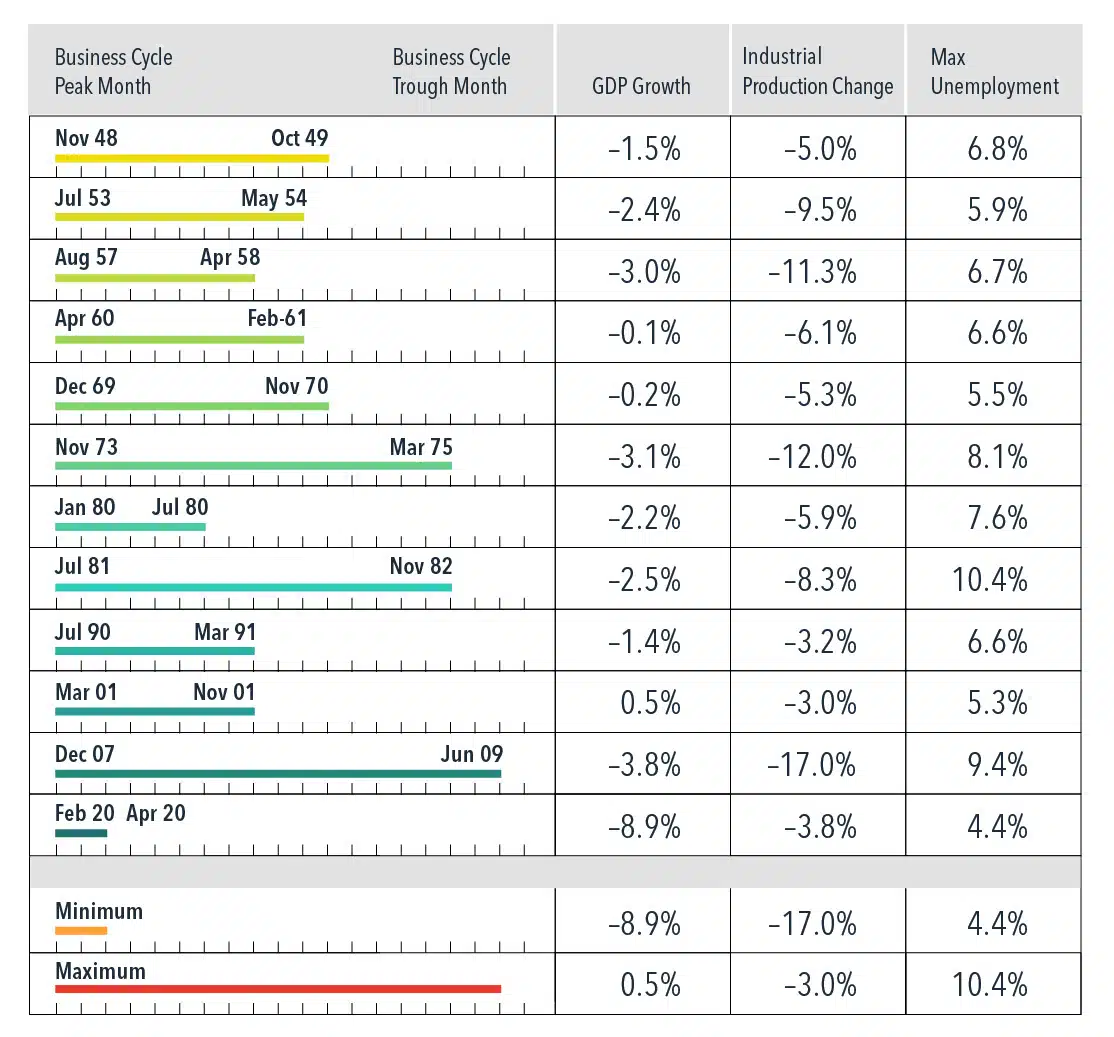
What Role Does the Financial Media Play in Investing?
Explore the role of financial media in investing and how to avoid emotional, headline-driven decisions.

Financial pundits continue to vacillate on the likelihood of a US recession. We have written in the past about the challenges of evaluating the real-time health of the economy. But why is it so hard to know if we are entering a recession? Understanding what defines a recession can help answer that question.
U.S. recessions are identified by the National Bureau of Economic Research (NBER). Their decisions factor in numerous economic indicators such as GDP growth, industrial production and unemployment, but they are not contingent on an exact formula. From the NBER website: “There is no fixed rule about what measures contribute information to the process or how they are weighted in our decisions.” (1) Accordingly, past recessions have come in all shapes and sizes, depending on what you are measuring.
The length of these recessions alone shows how much they can differ. The duration in months has varied from two to 18. The short end of that spectrum (March through April of 2020) appears an outlier, but even excluding that one, recessions have lasted anywhere from half a year to a year and a half. More importantly, economic indicators have varied in how “bad” they depicted things. For example, GDP growth during recessions was flat or even positive in a quarter of the observations. Industrial production declines and unemployment outcomes spanned an order of magnitude. But it is not as if all measures simultaneously point to dire each time the economy contracts.
The fact that there is no cookie-cutter formula for recessions adds to the challenge of predicting them. That is why attempts to make asset allocation changes based economic forecasts are often futile.
U.S. Recessions

This article originally appeared in Above the Fray, a weekly newsletter for Dimensional clients.
DISCLOSURES
The information in this material is intended for the recipient’s background information and use only. It is provided in good faith and without any warranty or representation as to accuracy or completeness. Information and opinions presented in this material have been obtained or derived from sources believed by Dimensional to be reliable, and Dimensional has reasonable grounds to believe that all factual information herein is true as at the date of this material. It does not constitute investment advice, a recommendation, or an offer of any services or products for sale and is not intended to provide a sufficient basis on which to make an investment decision. Before acting on any information in this document, you should consider whether it is appropriate for your particular circumstances and, if appropriate, seek professional advice. It is the responsibility of any persons wishing to make a purchase to inform themselves of and observe all applicable laws and regulations. Unauthorized reproduction or transmission of this material is strictly prohibited. Dimensional accepts no responsibility for loss arising from the use of the information contained herein.
This material is not directed at any person in any jurisdiction where the availability of this material is prohibited or would subject Dimensional or its products or services to any registration, licensing, or other such legal requirements within the jurisdiction.
“Dimensional” refers to the Dimensional separate but affiliated entities generally, rather than to one particular entity. These entities are Dimensional Fund Advisors LP, Dimensional Fund Advisors Ltd., Dimensional Ireland Limited, DFA Australia Limited, Dimensional Fund Advisors Canada ULC, Dimensional Fund Advisors Pte. Ltd., Dimensional Japan Ltd., and Dimensional Hong Kong Limited. Dimensional Hong Kong Limited is licensed by the Securities and Futures Commission to conduct Type 1 (dealing in securities) regulated activities only and does not provide asset management services.
RISKS
Investments involve risks. The investment return and principal value of an investment may fluctuate so that an investor’s shares, when redeemed, may be worth more or less than their original value. Past performance is not a guarantee of future results. There is no guarantee strategies will be successful.
DISCLAIMER
Shore Point Advisors is an investment adviser located in Brielle, New Jersey. Shore Point Advisors is registered with the Securities and Exchange Commission (SEC). Registration of an investment adviser does not imply any specific level of skill or training and does not constitute an endorsement of the firm by the Commission. Shore Point Advisors only transacts business in states in which it is properly registered or is excluded or exempted from registration. Insurance products and services are offered through JCL Financial, LLC (“JCL”). Shore Point Advisors and JCL are affiliated entities.

Explore the role of financial media in investing and how to avoid emotional, headline-driven decisions.

Asset location should not be confused with asset allocation. The two are related, but different, portfolio management techniques.

From new deductions to IRA deadlines, understand the 2025 tax updates that could affect your return and planning strategy.

Since 1926, the US stock market has rewarded investors with an annualized return of about 10%.